Charlie Campbell / Bangkok
Thu, August 31, 2023

Pita Limjaroenrat, leader of Thailand’s progressive Move Forward Party, at the party headquarters in Bangkok on April 19, 2023.
Pita Limjaroenrat doesn’t look like a defeated man. The 42-year-old former tech executive strides into the meeting room of his upstart Move Forward Party’s Bangkok headquarters wearing an immaculate navy-blue suit, fuchsia necktie, and a winsome grin. It’s not long before our discussion on Thai politics takes a not unwelcome detour into sport and music, particularly Pita’s fondness of rugby from his childhood in rural New Zealand, as well as his love of playing guitar and rock bands like Metallica, Iron Maiden, and Radiohead. “If I said I like Coldplay, nobody would vote for me!” he quips.
But vote for him, they did. Move Forward, led by Pita, won Thailand’s general election in May, securing 38% of popular support on the back of a radical manifesto to bridle the nation’s elite power nexus centered on its military, royal palace, and business conglomerates, capturing the imagination of especially younger Thais desperate to throw off decades of paternalistic rule. By all rights, having won a plurality 151 parliamentary seats, our conversation should not be taking place on the eighth floor of a smog-wreathed office block but five miles west in Bangkok’s 1920s neo-Gothic Government House.
However, after the election results were announced, that same entrenched establishment that Pita railed against at the stump whirred into action. Pita’s bid to become Prime Minister was blocked by the country’s military-appointed Senate, and he was hit by a flurry of legal challenges. One charge, that he secretly held shares in a media company, the defunct iTV, resulted in a ban on Pita serving as a lawmaker according to Thailand’s byzantine election rules. (Pita denies any wrongdoing.)
After months of post-election jostling, on Aug. 22, 61-year-old property tycoon Srettha Thavisin was instead confirmed into the top job by parliamentary vote thanks to his second-place Pheu Thai Party ditching its brief coalition with Move Forward to instead ally with 10 establishment and royalist parties. With that, Pita’s bold and popular agenda to reform Thailand’s controversial royal defamation law, end military conscription, and break up its business monopolies was consigned to the scrapheap.
Read More: Thailand’s Populist Pheu Thai Party Finally Won the Prime Minister Vote—But at What Cost?
It was a triumph of “old politics over new,” says Thitinan Pongsudhirak, professor of political science at Chulalongkorn University in Bangkok. “Old politics is horse-trading, pork-barreling, patronage; new politics is more transparent and accountable, which is what the Move Forward Party exemplifies and advocates.”
To have come so close only to have victory snatched away would send many people into a bitter spiral. The last two decades of Thai politics have been marked by disregarded voters being urged onto the street in often-bloody protests. Pita, however, is sanguine. “I’m extremely proud,” he says. “At the beginning of the campaign, most political pundits gave me 30 seats. So I beat their expectations five times!”
It’s a laudable outlook though one many Move Forward supporters struggle to share. For them, May’s election victory was a turning point, the moment when Thailand changed, and the fact that nothing effectively did has engendered a deep sense of betrayal across the nation of 70 million. In the northern city of Chiang Mai, one piece of graffiti scrawled on a traffic sign at a busy intersection said it all: “Why isn’t Pita Prime Minister?”

Pita greets supporters in Pattaya, Thailand, July 22, 2023.Lauren DeCicca—Getty Images
It’s a question that Pita has had to wrestle with himself. In the immediate aftermath of his victory, he spent days on a victory tour of far-flung provinces congratulating supporters. Some have suggested he should have stayed in Bangkok to build support from other parties and senators.
Of course, modern politics hinges on how far to compromise, gauging to what extent the desire to enact change justifies diluting that change itself. Pita’s relentless targeting of Thailand’s royal defamation law, known as lèse-majesté or Article 112, struck at the establishment’s most cherished shibboleths. Since November 2020, more than 200 people have been arrested under Article 112 relating to activities at pro-democracy rallies and comments made on social media. They include a 26-year-old man jailed for three years in March for selling satirical calendars featuring a rubber duck—a pro-democracy protest symbol.
Read More: Thai Teen Jailed for Mocking the King as Prospects of Royal Defamation Reform Dim
Nevertheless, Move Forward was the only party committed to curbing Article 112, and reneging on that pledge was never an option for Pita. “I was willing to be flexible,” he insists. “But a flat-out dishonest maneuver in order to have this interview in Government House? I couldn’t do it.”
Not all parties felt the same. Much of the ire for Move Forward’s sidelining has been directed at Pheu Thai, which for more than two decades played the role of Thailand’s anti-establishment foil and has seen its own past elected leaders ousted in military and judicial coups but still entered an unholy marriage of convenience with the very forces it once campaigned against to secure power.
Compounding the sense of gross perfidy, Pheu Thai’s de facto patriarch, billionaire former Prime Minister Thaksin Shinawatra, returned from 15 years in self-imposed exile on the same day that Srettha was confirmed as Prime Minister. Thaksin was arrested at the airport and sentenced to eight years for historical in absentia convictions of corruption and abuse of power, though within hours the 74-year-old was transferred from his jail cell to a hospital suite amid persistent rumors and reports of a forthcoming royal pardon.
That Pheu Thai seemingly did a deal that keeps Move Forward out of power in exchange for Thaksin’s return has enraged many of Pheu Thai’s own voters, some of whom burned effigies outside the party’s headquarters. Even innocent choc-mint drinks were suddenly rendered objects of scorn, as they are known to be a favorite of Thaksin’s daughter, Paetongtarn Shinawatra, prompting many cafes to refuse to sell them. Thai artists have flooded social media with sardonic images of treachery, such as tanks wrapped in red shirts—the enduring symbol of Pheu Thai’s firebrand supporters.
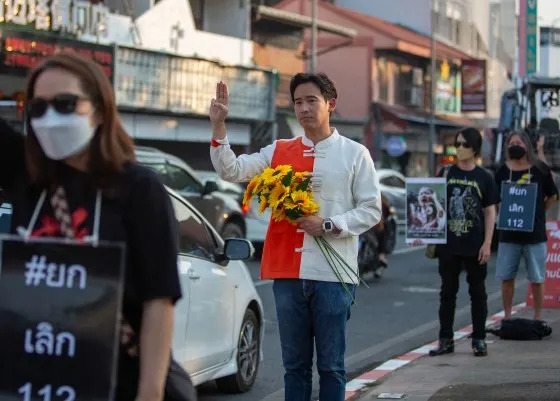
Pita joins a demonstration—demanding the release of two young pro-democracy activists who were detained for criticizing the monarchy—at Tha Phae Gate in Chiang Mai, Thailand, Feb. 4, 2023.Pongmanat Tasiri—SOPA/LightRocket/Getty Images
Was Pita hung out to dry by Pheu Thai in order to bring Thaksin home? For Pita, personally, the subject of betrayal is complex. Thaksin was his mentor as a young man and even penned his recommendation letter to Harvard. When Thaksin was first ousted by a coup d’état during a visit to the U.N. General Assembly in New York in 2006, Pita was traveling alongside him. Today, Pita may not be carrying Thaksin’s bag, but he’s reluctant to throw him under a bus either.
“He has every political and civil right to return to Thailand,” says Pita, “just like all the political refugees that have been chased away from their own country for the past 20 years.”
Of course, if anyone can sympathize with an ignored popular mandate it is Thaksin. Before May’s ballot, populist parties backed by the policeman-turned-media mogul won every election since 2001, only to be deposed thrice by the military and twice by the courts. (One Thaksin proxy, former Prime Minster Samak Sundaravej, was farcically ousted in 2008 over 5,000 baht ($350) he received in travel expenses for hosting a televised cooking show.)
That Thaksin has switched from victim of Thailand’s anti-democratic elite to their ally and enabler is, at the very least, a cruel lesson in realpolitik. “Before the election, I did believe that [Pheu Thai] were part of the larger force to turn Thailand toward democracy,” says Pita. Now, however, he fears their goal was “to become the government at whatever cost they had to bear.”
“I hope the return of Thaksin and Pheu Thai’s efforts to form a government were decoupled,” he adds. “But I don’t know if my hope is true or not.”
Pita may have usurped Thaksin as anathema of the Thai establishment, though for an anti-elitist, he’s very much the iconoclast. Born in Bangkok to an affluent and politically connected family, Pita was privileged enough to attend secondary school in Hamilton, New Zealand, where he says he gained his political awakening. Back then, there were only three TV channels, and given the choice between watching the Australian soap opera Home and Away and parliamentary debates, he chose the latter, listening to the speeches of then Prime Minister Jim Bolger while he did his homework.
“I would look at the way agriculture is done in Thailand versus New Zealand, the way education in Bangkok compares to Hamilton,” he says. “All those things played a vital foundation of how I view the world, how I view democracy, and how I view politics.”
After completing his undergraduate degree in finance and banking at Bangkok’s Thammasat University, Pita enrolled at the University of Texas at Austin, where he got his first taste of American retail politics during the 2000 presidential election between then Texas Governor George W. Bush and Vice President Al Gore. “I could feel the vibe; people were really active citizens; there were Bush signs in front of their lawns; they were volunteering,” Pita recalls. “So I understood that American politics is a different level than what I had seen back home or in New Zealand.”
Pita returned to Thailand at age 25 to take over the family business, CEO Agrifood, after the death of his father. Despite his youth and inexperience, he helped the company recover from huge debts to become one of Asia’s largest producers of rice bran oil.
But politics was always his aim, and Pita soon returned to the U.S. to complete a joint master’s degree from MIT and Harvard in business and public policy. It was the run-up to President Barack Obama’s 2012 election victory and proved hugely instructive. “Obama was coming a lot to speak at Harvard; John Kerry was there all the time, so I would bring a brown bag lunch to hear them,” recalls Pita. “And I saw how they had a phone booth, and would knock on doors, and tell people where to go vote, and how you register the vote in advance, and how important it was to call people and remind them.”
In 2018, after working in banking and management consultancy and a brief stint as the executive director of Grab Thailand, Pita joined Move Forward’s predecessor party, Future Forward, where he was tasked with agricultural policy. He was elected to parliament in 2019 and soon earned a reputation as a rising star on the back of impassioned speeches about the plight of the nation’s farmers. In March 2020, Thailand’s Constitutional Court dissolved Future Forward and banned its executives from politics for 10 years. When Move Forward rose from its ashes, Pita emerged as a key leader.

Pita waves to supporters while holding his daughter Pipim at a Move Forward rally in Bangkok in May. Sirachai Arunrugstichai—Getty Images
Pita’s rise on the political stage, however, came with greater scrutiny on his life behind the scenes. In 2019, Pita’s marriage to Thai actress and model Chutima Teenpanart fell apart. It was an acrimonious divorce during which Chutima accused Pita of being controlling and abusive. Pita strenuously denies physically injuring his ex-wife, and the case was dismissed in court, though she in turn said that “violence may not have been an issue but he did harm me psychologically.” Earlier this year, Chutima signaled her support for Pita’s election campaign. “It’s been a long time. Let it pass. In any case, I’m cheering for Pipim’s dad,” she posted online, referencing their seven-year-old daughter whom they share custody of and who frequently joined her father at Move Forward rallies.
Pita says he’s “not at all” surprised that allegations about his private life were seized upon by political opponents. “I’ve been preparing to become a politician since my 20s,” he shrugs.
The question remains what comes next for Pita—and Thailand. The nation appears more polarized than ever, with its largest party shut out of power ostensibly due to its efforts to amend Article 112. For decades, Thailand’s royal family was a unifying force. Today, however, it’s been recast as the fault-line by which politics are defined.
It’s a schism that promises to deepen after Thailand’s Constitutional Court agreed to hear a case against Move Forward regarding whether its campaign to reform lèse-majesté constitutes treason. In particular, the suggestion by the party’s deputy secretary-general Rangsiman Rome that Thailand should switch its national day from Dec. 5—the birthday of beloved former King Bhumibol Adulyadej—to June 24, the day the nation moved from absolute to constitutional monarchy, was seized upon by royalists as evidence of republican intent. A guilty verdict could see the party dissolved, like Future Forward before it, and party executives banned from politics for life, or potentially even jailed.
Asked about Rangsiman’s remarks, Pita admits that “the cadence was a bit off,” though he says that “diversity is a strength of our party, not a weakness.” Pita insists that his goal was never to tarnish the monarchy but to place it “above politics,” which, he says, is the surest way to ensure its longevity as “a vital institution of national unity.”
Being squeezed out of power and threatened with dissolution and jail might not seem like a reason to celebrate. Still, the stakes were always plain, and Pita, like Future Forward’s leaders before him, was willing to pay the costs. “They are already prepared for this,” says Aim Sinpeng, a senior lecturer at the University of Sydney. “It’s a party that doesn’t run on money, but on ideas and ideology, because it’s a movement.”
Thailand’s progressive movement remains “in a very strong position,” agrees Napon Jatusripitak, a visiting fellow at the ISEAS-Yusof Ishak Institute in Singapore. “They can ban Pita or dissolve the party, but by doing that, they’ll only crystalize this movement into stronger support for its future incarnation.”
Pita appears to float above the uncertainty. If Move Forward gets to take a place in the opposition: “We can do a lot more to provide checks and balances in parliament and speak on the behalf of the people,” he says. And if he is banned, then he knows there are many others waiting to take up the cause.
“I’m not planning to be in Thai politics forever,” he says, revealing intentions to perhaps explore a role in international organizations like the U.N. “I don’t want to be 70 or 80 and sleeping in the parliament and speaking nonsense about blockchain and AI! I want to be able to pass the baton to the next generation of leaders.”
Thaksin: Former Thai PM's prison sentence reduced to a year
Nicholas Yong & Jonathan Head - In Singapore and Bangkok
Fri, September 1, 2023

Former Thai prime minister Thaksin Shinawatra returned home in August after a 15 year exile
Thailand's King has reduced the eight-year prison sentence of former prime minister Thaksin Shinawatra to a year.
Mr Thaksin, who returned home last month after 15 years of self-imposed exile, was immediately sent to jail.
He was then moved to the luxury wing of a state hospital after complaining of heart problems.
Mr Thaksin had previously said the outstanding sentences, over charges of corruption and abuse of power, were politically motivated.
Deposed by a military coup in 2006, Mr Thaksin, one of Thailand's most influential and polarising personalities, left the country two years later to avoid a prison sentence.
His return on 22 August was assumed to be part of a wider political deal. And it was one that was meant to bring his popular Pheu Thai party together with its one-time adversaries in a compromise government.
And it did that. Hours after he arrived, a new coalition government, led by Pheu Thai, voted its candidate Srettha Thavisin as the new PM. The coalition includes Mr Thaksin's former military rivals who deposed his party in 2014 in a coup.
Who is Thaksin Shinawatra?
Thaksin's return seals grand Thai political bargain
Mr Thaksin clearly hoped for leniency as a part of that deal, and King Vajiralongkorn has responded quickly to his request for a pardon, reducing his eight-year sentence to just one. Mr Thaksin is likely to stay in hospital.
In response to his request for a royal pardon, the royal gazette on Friday noted his age and "illness". It added that Mr Thaksin "has done good for the country and people and is loyal to the monarchy".
However, Mr Thaksin must have hoped his sentence would be overturned, and not just reduced.
His continued incarceration will limit his ability to influence his party, as it struggles to manage an unwieldy coalition in which it holds only around half the parliamentary seats. It also faces energetic opposition from the youthful Move Forward party, which eclipsed Pheu Thai to come first in the last general election.
But Move Forward was unable to form the government, even after agreeing to a coalition with Pheu Thai. Together, the two parties were unable to gain the assent of the 250-member unelected senate, which is allowed to join the 500 elected MPs in voting for the Thai PM.
By coming back and accepting his sentence Mr Thaksin has now settled the bitter rivalry with conservative royalists that has hung over Thailand for the last 20 years. But at the cost of being a much-diminished political figure.




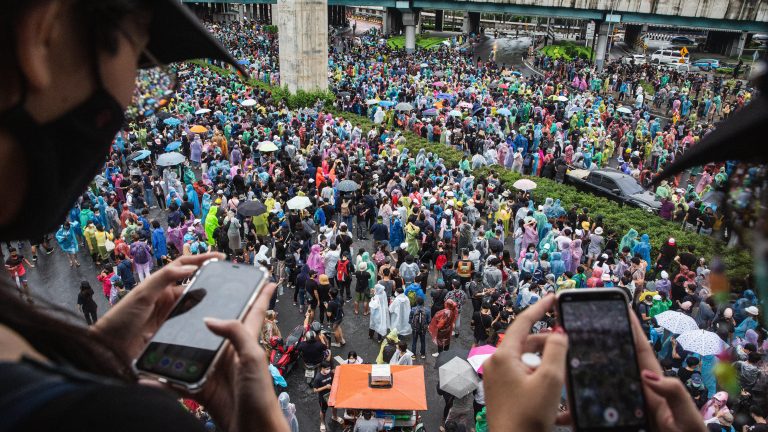




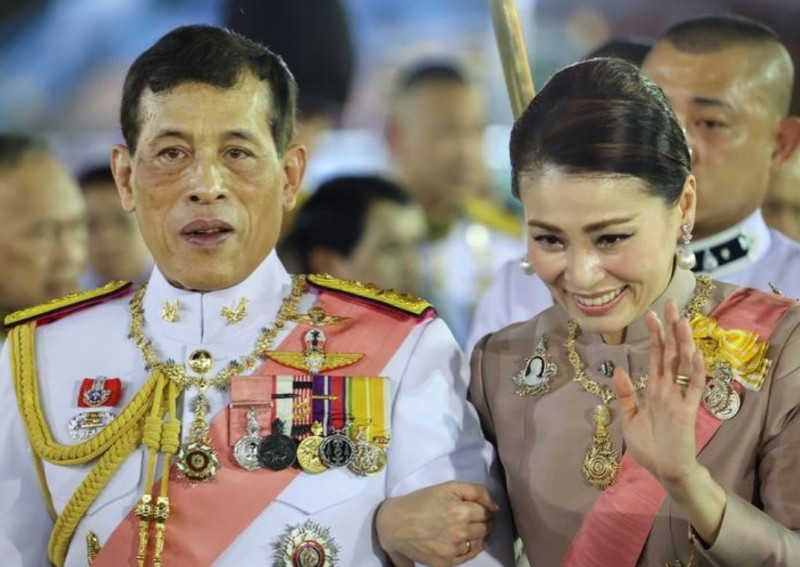
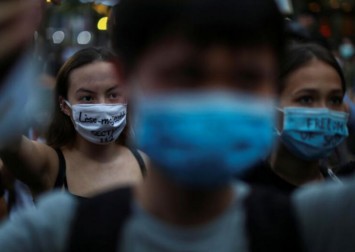

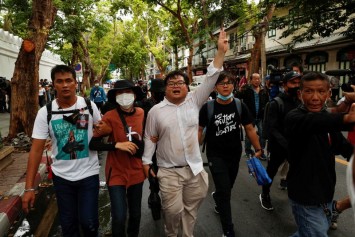



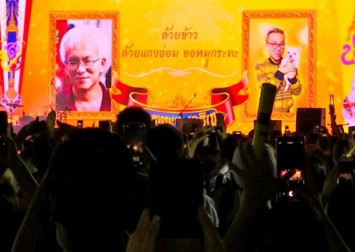

/cdn.vox-cdn.com/uploads/chorus_image/image/67647948/1229122703.jpg.0.jpg)